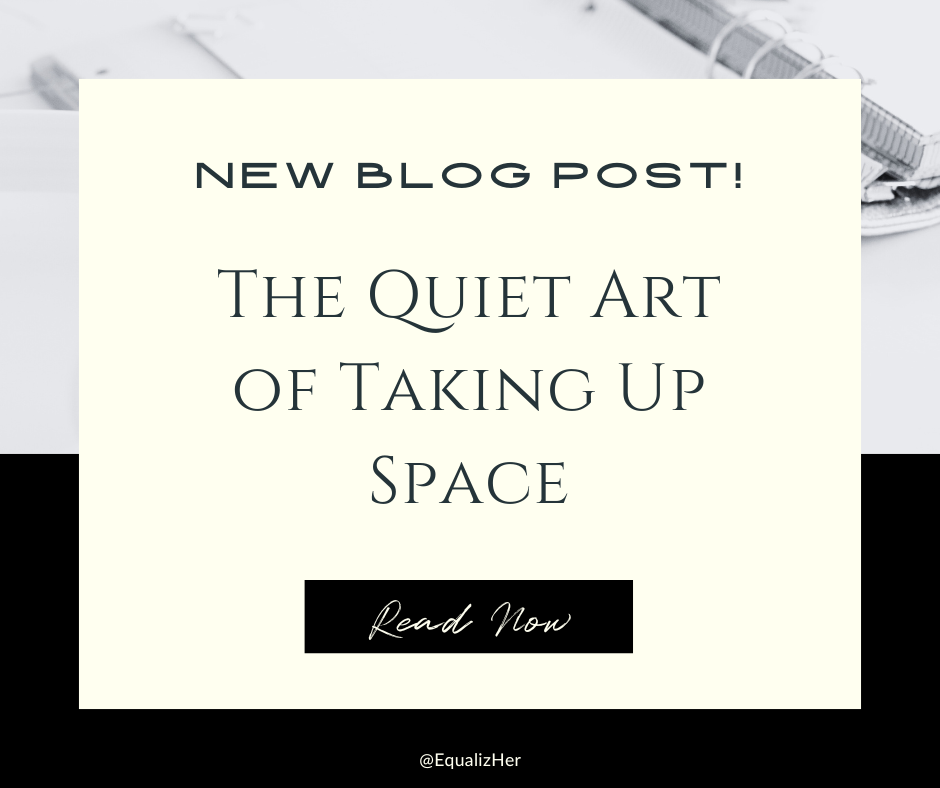Why presence matters more than performance—and how to cultivate both
There’s a subtle moment many women experience—often without noticing—when they enter a room, a conversation, a creative collaboration, or a meeting. It’s that near-invisible shift where you scan the space, assess the dynamic, and instinctively begin adjusting yourself. You might not speak as firmly as you’d like. You might hold back a fully formed idea until you’re sure it’s safe. You might even soften your energy—not because you’re uncertain, but because you’ve learned it makes you more “acceptable.”
It doesn’t always look like shrinking. Sometimes it’s quieter than that. It looks like pausing when you have something to say, rephrasing a bold truth to make it more palatable, or nodding when you’d rather push back.
For many women, this isn’t about self-doubt—it’s about conditioning.
We’ve learned to be thoughtful, agreeable, likeable. To read the room before we read ourselves. To seek alignment before asserting our own direction.
But over time, this habit—this constant calibrating—dulls your voice. And more than that, it makes you feel like taking up space is something you need to earn.
At EqualizHer, we work from the inside out. We don’t rush to perform, fix, or chase validation. We start by pausing. Listening. Rooting ourselves.
Because true presence—real, embodied, feminine presence—isn’t something you perform. It’s something you return to.
Performance Is Not Presence
In a world that rewards visibility, many of us have mistaken performance for power. We think if we speak louder, show more, do more—we’ll finally be taken seriously.
But performance and presence are not the same.
Performance is external. It’s reactive. It needs an audience. It’s exhausting.
Presence is internal. It’s rooted. It’s independent of applause. It’s sustainable.
The truth is, the most powerful women I’ve known aren’t the ones commanding attention with noise or bravado. They’re the ones who’ve stopped asking for permission. The ones who aren’t performing competence—they’re inhabiting it.
Quietly. Completely.
They don’t rush.
They don’t explain.
They don’t dilute their thoughts.
They speak—and the room leans in.
So What Does It Mean to Take Up Space?
Taking up space isn’t just about speaking in meetings or asking for a raise—though those matter too.
It’s about a kind of internal expansion. A quiet, conscious decision to stop shrinking parts of yourself in service of other people’s comfort.
It’s how you hold yourself when you know what you’re saying is right—even if it’s unpopular.
It’s how you carry your ambition without apology.
It’s how you stop performing usefulness and start embodying clarity.
It’s also not always visible to others.
Sometimes taking up space means not answering every email instantly.
Sometimes it means pausing a project that no longer feels aligned.
Sometimes it’s the silent act of reclaiming time to reconnect with your own voice before you use it.
And that’s what makes this a quiet art.
Because no one else will know the decision you made.
But you will.
And that’s where presence begins.
The Audio Work of Empowerment
In our courses, we use audio visualisations to create space for this kind of shift. Because real empowerment doesn’t start with a slogan or a checklist—it starts with a recalibration inside the body.
The breath slows.
The posture softens.
The mind stops racing.
And in that space, you remember something you didn’t realise you’d forgotten: you were never too much. You were never not enough.
You were just waiting to feel safe to be fully present.
To be seen not as a polished version of yourself, but as the whole thing.
This kind of inner work isn’t fluffy. It’s foundational.
It’s how you stop outsourcing your value to other people’s reactions.
It’s how you build the kind of resilience that doesn’t need applause to keep going.
Taking Up Space in Your Own Time
This isn’t a command to speak more.
Or to take over the room.
This is an invitation.
To notice where you’ve been holding back,
Not because you were uncertain,
But because you’ve been too practiced at shrinking.
And then—
To make one small move toward expansion.
It could be as subtle as finishing your sentence instead of cutting it short.
Or keeping a pause before responding, instead of rushing to prove your usefulness.
Or writing something you’ve been avoiding—not to share it right away, but simply to let your voice live somewhere.
This is not about becoming someone new.
It’s about coming home to who you already are.
The part of you that doesn’t perform.
The part of you that’s always known what matters.
The part of you that doesn’t need to be louder—just more present.
You Don’t Have to Earn Your Place
Let’s end with this:
You do not have to earn your space.
Not by over-delivering.
Not by proving your worth again and again.
Not by keeping everyone comfortable.
Your presence is not something you unlock when the timing is right or the audience is ready.
It’s something you can step into now—gently, intentionally, and without apology.
So the next time you’re in a room—real or metaphorical—
And you feel the old habit of shrinking, adjusting, dimming your voice—
Pause.
Breathe.
Remember:
You’re not here to perform.
You’re here to create.
To lead.
To be.
And that? That is enough.


0 Comments